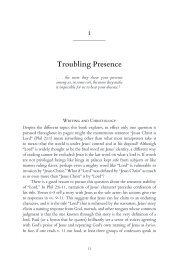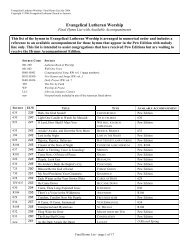19. Pastoral Letters: 1 Timothy, 2 Timothy, Titus - Augsburg Fortress
19. Pastoral Letters: 1 Timothy, 2 Timothy, Titus - Augsburg Fortress
19. Pastoral Letters: 1 Timothy, 2 Timothy, Titus - Augsburg Fortress
You also want an ePaper? Increase the reach of your titles
YUMPU automatically turns print PDFs into web optimized ePapers that Google loves.
Copyrighted Material<br />
<strong>Augsburg</strong> <strong>Fortress</strong> Publishers<br />
1 timothy, 2 timothy, titus 425<br />
That there should be a church in Crete is not surprising. The account in Acts, however,<br />
places Paul there only tangentially, and then as a prisoner (Acts 27:7-15). Could he<br />
have had the opportunity to found churches or to commission a delegate to found<br />
them? The phrase “I left you in Crete” is also ambiguous. Did Paul take his leave of<br />
<strong>Titus</strong> there? Or did Paul leave <strong>Titus</strong> in an assignment?<br />
Second <strong>Timothy</strong> is written from (probably a Roman) captivity (1:16-17). But does<br />
Paul’s reference to a first defense (4:16) indicate that this is a second imprisonment,<br />
since he was released from the first (4:17)? In contrast to l <strong>Timothy</strong> and <strong>Titus</strong>, 2 <strong>Timothy</strong><br />
contains information about fifteen of Paul’s helpers (4:9-21). Nothing in their<br />
movements directly contradicts the little we know of them elsewhere, although some<br />
scholars have great difficulty with the apparent discrepancy between Acts 21:29 and<br />
2 Tim. 4:20 in the matter of Trophimus. Other information is startlingly confirming,<br />
such as the short remark “Erastus remained in Corinth” (4:20; cf. Rom. 16:23).<br />
The problem is rendered more difficult by the attempt to place all the letters in the<br />
same time frame. The following options are possible. Some think the letters are pseudonymous<br />
and written at the same time after Paul’s death. The biographical information<br />
in this case only serves the interest of pseudonymity and is thus irrelevant. A<br />
second option invokes the ancient tradition (cf. 1 Clem. 5.7) that Paul was released<br />
from a first Roman imprisonment and preached in Spain before again becoming a<br />
captive and finally being put to death. Supporters argue for a period of active work<br />
between the two imprisonments, such as is reflected in these letters. A third option is<br />
to regard the letters as genuinely Pauline and to try to fit them into Paul’s ministry as<br />
we know it from Acts and the other letters. This is not impossible, although it requires<br />
considerable ingenuity.<br />
A fourth option is the best, though rarely chosen. It admits that neither Acts nor<br />
the letters give us a full chronology of Paul: Acts gives us only a selective and highly<br />
stylized rendering of Paul’s travels, while the letters provide only fragmentary bits and<br />
pieces of information. Thus, while the <strong>Pastoral</strong>s do not by themselves account for<br />
their placement in his life, they may give us important information about incidents in<br />
Paul’s career and captivity that the other sources do not. Just as 2 Corinthians tells us<br />
of imprisonments we would otherwise not suspect, so do these letters tell us of Pauline<br />
missionary endeavors—in Crete and Dalmatia—that, aside from the tantalizing reference<br />
to Illyricum in Rom. 15:19, would otherwise be unknown to us.<br />
The criterion of style is difficult to apply to the <strong>Pastoral</strong>s. They obviously contain a<br />
large number of words not found in other Pauline letters and share other terms not<br />
otherwise attested in the NT. But there are also real differences among the three letters.<br />
On the whole, 2 <strong>Timothy</strong> has a vocabulary remarkably close to that of other Pauline<br />
epistles, whereas the terminology in 1 <strong>Timothy</strong> and <strong>Titus</strong> varies more significantly.<br />
How much of this special vocabulary is due to the nature of the letters, the character<br />
of the addressees, and the subject matter is difficult to determine. Unlike the genuine<br />
Pauline letters, there is no indication that the letters were dictated to a scribe, although




